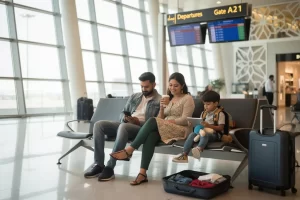Canadian travellers heading to India need to follow some key rules for OCI, PIO, and e-Visa entry. Here’s a simple guide for Indian families, students, and working professionals with Canadian passports. To visit India, Canadian travelers must secure the appropriate visa, as specific entry requirements and legal considerations apply when planning travel with the keyword. A valid Canadian passport must have at least six months of validity and two blank pages to apply for an Indian visa. To apply for a regular visa, Canadians must submit a printed application and supporting documents at a BLS International Centre, which handles visa services on behalf of the Indian mission.
Inshorts
OCI gives lifelong, hassle-free entry to India for eligible people.
PIO cards are valid till December 31, 2025; convert soon to OCI.
e-Visa is online, covers tourism, business, and medical visits. Always apply before travel through only the official website to avoid such unscrupulous elements.
E-Arrival Card is now mandatory before entering India for all OCI/PIO cardholders and foreign nationals.
Carry a passport with 6-month validity and two blank pages. Make sure to verify your passport number carefully when filling the application online.
Entry rules differ for students, professionals, and families; know your visa type.
Overstaying leads to penalties—register if you stay more than 180 days.
OCI Cardholders: Perks & Entry Rules for Canadian Citizens
Overseas Citizen of India (OCI) cards offer lifelong, multiple-entry visas to India, simplifying travel for eligible Canadians of Indian origin. Indian families, students, and professionals can enter India for work, study, family visits, or tourism without needing a separate visa. OCI application and renewal are now fully online, making the process smoother.
What you must remember:
Always carry your OCI card and valid passport on arrival.
The passport should have at least 6 months’ validity and two blank pages for stamping.
OCI does not grant Indian citizenship but offers most travel benefits.
Free to stay in India as long as you wish, but register with the Foreigners Regional Registration Office (FRRO) if you stay over 180 days.
Strict penalties are enforced for overstaying a visa in India, including fines and potential detention.
PIO Card: Last Validity Extension for Canadian Citizens
Person of Indian Origin (PIO cards) are still valid for entry/exit into India for Canadians until December 31, 2025. After this, you must convert your PIO to an OCI card—no more extensions will be provided. Canadian military, defense, or police personnel are not eligible for an e-Visa and must apply for a regular paper visa.
Key advice for PIO holders:
Handwritten PIO cards can become invalid if international rules change, so convert to OCI soon.
You must carry both your PIO card and a valid foreign passport to be allowed entry.
The PIO card conversion is not automatic; formal application is required before deadline.
India’s e-Visa: e Medical Visa, e Business Visa, e Tourist Visa, and e Conference Visa for Short Stays
Canadian citizens from eligible countries can apply for an e-Visa application online minimum 4 days in advance of their intended travel through the official Government of India website. Avoid unauthorized websites and intermediaries that may misuse data or charge money unnecessarily. The e-Visa is available for tourists, business visitors, and medical treatment purposes. Applications must be submitted at least 4 days before the expected date of travel. The process includes uploading a photo and passport page, with Electronic Travel Authorization (ETA) sent via email after processing.
Key points:
Visa types include tourist, business, medical, medical attendant, and conference e-Visas, each with specific entry limits.
The e-Conference visa allows single entry for 30 days; e-Medical and e-Medical Attendant visas permit triple entry.
Short-term e-Visas allow stays up to 30 days; 1- and 5-year e-Visas allow multiple entries with a max 180-day stay per calendar year.
Applicants must correctly select arrival and first arrival dates during the online application form.
Applicable e visa fees, including an $80 USD fee for Canadians plus bank transaction charges, are charged additionally and are non refundable. These fees must be paid online.
Entry with an invalid visa risks being denied entry by immigration officials.
Entry is allowed at 29 airports and five seaports.
Keep printed and digital copies of your visa and passport for immigration.
The Indian e-Visa Canada process is the fastest and easiest way for Canadian citizens to obtain their visa online for travel to India.
Canada to India flights are supported at major airports where e-Visa holders can enter.
For those planning to study in India, securing the correct visa type is essential to ensure smooth entry and stay.
New Mandatory Rule: E-Arrival Card for Canadian Citizens
Effective 1st October 2025, every foreign traveler, including OCI and PIO cardholders, must fill the e-Arrival Card up to 72 hours before entering India. It collects personal and travel information, replacing the old paper forms. Indian citizens do not need this card. Travelers must print the ETA to present it at the immigration check post upon arrival in India.
Complete online on the official government website or Visa Su-Swagatam app.
Entry will be denied if this step is missed.
The processing time for e-Visa applications is usually around 3-4 business days, so plan accordingly to avoid delays.
Important Reminders for Canadian Citizens Visiting Northeastern India and Other Regions
Always have proof of onward/return travel and sufficient funds for your stay.
For stays over 180 days, register with FRRO within 14 days of arrival.
Canadian passports must be valid for at least 6 months from arrival date.
Overstaying may lead to fines, detention, or travel bans—respect visa expiry dates.
Keep travel documents and visa approvals accessible, including digital copies.
Avoid crowded areas and public transportation during unrest or anti-Canada protests, especially in the national capital region and Northeastern India where negative sentiment may be prevalent.
Be cautious of terrorist attacks in Jammu and Kashmir, Northeastern India, and insurgent-affected rural areas. Stay informed via traditional media.
Petty crime like pickpocketing is common, especially targeting foreigners in busy areas.
Report any sexual harassment or assault immediately to local authorities and Canadian consular offices.
Emergency medical services may be slow and under-equipped.
Take precautions against cholera by practicing safe food and water habits.
Avoid travel to Jammu and Kashmir due to security risks.
Some areas require special permits; check before visiting restricted or protected zones.
Rabies risk exists from animal bites or scratches.
Malaria risk may require antimalarial medication depending on itinerary.
Road conditions can be hazardous; traffic accidents are frequent.
Keep contact info for Canadian consular services; in-person help may be limited in Bengaluru, Chandigarh, and Mumbai—contact New Delhi office.
Look for the best flight deals to India when planning your trip to make your travel affordable and convenient.
Frequently Asked Questions (FAQs) About e Medical Visa, e Business Visa, e Tourist Visa, and e Conference Visa for Canadian Citizens
Can Canadian citizens apply for an Indian e-Visa?
Yes, Canadian citizens from eligible countries can apply for tourist, business, and medical e-Visas exclusively through the official website of the Government of India.
How long before my trip should I apply for the Indian e-Visa?
It is recommended to apply online at least 4 days prior to your selected arrival date to allow sufficient processing time.
Are Canadian military or police personnel eligible for the Indian e-Visa?
Canadian military or police personnel are required to apply for a regular visa at an Indian consulate or embassy instead of the e-Visa.
What should I do if my passport is lost or stolen while in India?
You should report the loss immediately and obtain an exit visa from the Foreigners Regional Registration Office (FRRO) before departing India.
Can I stay in India longer than 180 days on an e-Tourist Visa?
The maximum stay allowed on an e-Tourist Visa is 180 days. If you plan to stay longer, you must register with the FRRO.
Can I visit restricted or protected areas in India with an e-Visa?
Visiting restricted or protected areas requires special permits issued by India’s Bureau of Immigration, even if you hold an e-Visa.






